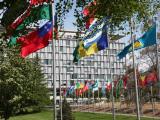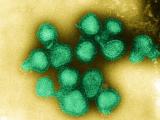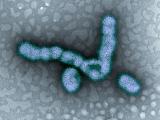Feb 24, 2010 (CIDRAP News) – The World Health Organization's (WHO's) emergency committee of experts yesterday recommended holding at the current pandemic alert level based on evidence of new community spread of the virus in West Africa and the possibility of a second wave of illnesses as the Southern Hemisphere enters its winter months.
Keiji Fukuda, MD, special adviser to the WHO director-general on pandemic flu, told reporters at a press briefing today that the emergency committee, set up under International Health Regulations (IHR), met in a 2-hour teleconference yesterday and discussed whether to move from pandemic alert phase 6 (pandemic phase) to a post-peak phase.
He said the committee provided the director-general with views on the status of the pandemic and reviewed the current recommendations. He said yesterday's deliberations were the committee's seventh meeting over the span of the novel H1N1 outbreak.
Fukuda said that, based on yesterday's discussion, it's clear the pandemic situation varies in different parts of the world. Though flu activity continues to taper off in many Northern Hemisphere countries, the virus is still active in areas such as Eastern Europe and central Asia, and there are increased reports of new pandemic activity in the West African countries Senegal and Mauritania.
Though many countries in the Northern Hemisphere have had two pandemic flu waves, many Southern Hemisphere nations have had only one, and those countries are just entering their winter months, when increased influenza activity is anticipated, Fukuda said. The Southern Hemisphere's flu season typically runs from May through October; however, the pandemic H1N1 virus has been unpredictable, peaking twice in some countries such as the United States outside the normal flu season.
Members of the emergency committee were concerned that transitioning to a post-peak pandemic phase could undermine control actions in some countries, he said, adding that the group said it would revisit the issue over the next several weeks when more epidemiological evidence is available.
Dr Margaret Chan, the WHO's director-general, asked the committee to review three specific IHR recommendations, according to a statement today from the WHO. The committee favored continuing the recommendations, but urged an update to the second recommendation, replacing "intensify" with "maintain" regarding surveillance. The recommendations thus now read:
- Countries should not close borders or restrict international traffic and trade.
- Maintain surveillance of unusual flu-like illness and severe pneumonia.
- If ill, it is prudent to delay travel.
Fukuda said the committee's discussions yesterday highlight the real-world complexity of responding to a large-scale event such as a pandemic and the need to acknowledge the reality of the situation, such as the fact that the current pandemic virus is less severe than experts anticipated. Though the virus is unpredictable, it's clear that the world needs plans and guidance, which should be adjusted as needed, he said.
The WHO continues to endorse vaccination, especially because the pandemic H1N1 virus continues to dominate seasonal strains, Fukuda said. The vaccine has excellent safety and efficacy profiles, and the WHO estimates that about 300 million people across the globe have been immunized.
Most of the flu vaccine that many Southern Hemisphere countries have is a trivalent vaccine that contains the pandemic strain, though many also have supplies of the monovalent pandemic vaccine.
The WHO is pressing ahead with seeking donations of and channeling pandemic vaccine and ancillary supplies for developing countries, Fukuda said.
See also:
Feb 24 WHO statement


















